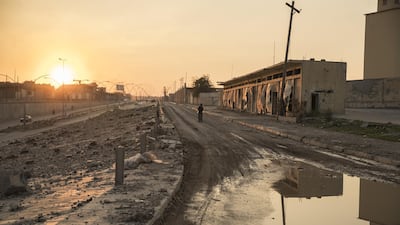Dozens of people were killed and thousands more were displaced across Iraq over the past four days, as flash floods and torrential rainfall battered the semi-arid country.
Health ministry spokesman Seif al-Badr on Sunday raised the death toll from 17 to least 21 people killed, including women and children, over the past few days. At least 180 others were injured, he was quoted as saying by AFP.
The floods caused by heavy rainfall displaced tens of thousands of people, the UN Office for the Coordination of Humanitarian Affairs (OCHA) said on Sunday.
An estimated 10,000 people in Salah Eddin and 15,000 people in Ninewa are in need of assistance, including thousands of families living in IDP camps, OCHA said, adding that the Shirqat district in Salah al-Din, and Qayyarah Airstrip and Jeddah IDP camps in Ninewa, are among the worst affected.
The floods have shed new light on the plight of areas battered by the war against ISIS and have made the issue of reconstruction more urgent in light of the devastation caused by this week’s storms.
They have also raised questions over who is to blame for the deteriorating infrastructure that allowed for road washouts and wide-spread disruption across parts of the country, at a time when the government has failed to tackle the issue of rampant corruption in the public sector.
The matter continues to be urgent with forecasters at Iraq's metrological department expecting rainfall to continue on Sunday, despite a small rise in temperatures. Iraq’s ministry of water resources on Sunday warned that more flash floods could hit the eastern districts of Wasit and Misan.
Prime Minister Adel Abdul Mahdi convened a meeting of the so-called 'governmental crisis management cell' on Friday to coordinate the emergency response activities of relevant ministries and the Iraqi Red Crescent Society.
“We are assessing the situation to see where we could further assist the Government of Iraq in its response to this severe flooding,” Ms Marta Ruedas, the UN’s Humanitarian Coordinator for Iraq said in a statement released one day after the meeting.
The Iraqi Health Ministry on Sunday said it was doing everything it could to locate and rescue people affected by the floods. OCHA says the health ministry is planning to deploy mobile health clinics.
The Iraqi oil ministry on Sunday announced the provision of thousands of free litres of fuel and oil to Ninewa and Salah Eddin to help with recovery efforts.
The trade ministry said it had sent food rations, including more than a thousand bags of flour, to Salah Eddin and Ninewa. It is also drafting an emergency plan to ensure food is also delivered to Misan, Diyali and Wasit governorates, it said.
However, aid groups and the government are struggling to deliver aid because of blocked roads.
Videos posted on social media networks showed houses and roads submerged under water. Heavy winds uprooted trees and a number of electricity poles, leading to power outages in many southern cities of Iraq.
OCHA says initial accounts from flooded areas include the destruction of homes, livestock, and household items.
In 2015, 58 Iraqis were killed in floods and cases of electrocution due to intense downpours.

